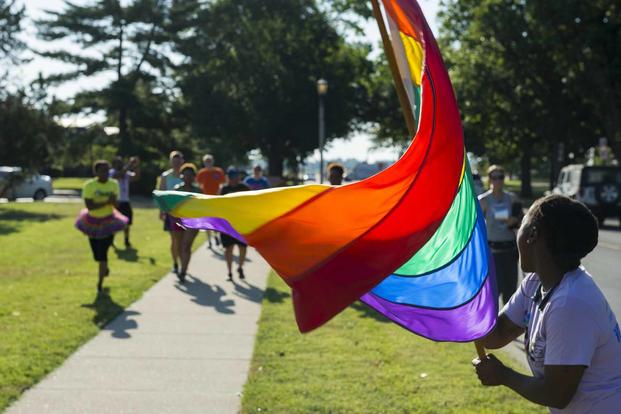The Pentagon will start reviewing the records of military personnel who may be eligible for a discharge upgrade as a result of getting kicked out under the "Don't Ask, Don't Tell" policy, which prevented gay and lesbian troops from serving openly until it was repealed in 2011.
Deputy Defense Secretary Kathleen Hicks announced Wednesday that the Department of Defense will examine the records of veterans discharged between Feb. 28, 1994, and Sept. 20, 2011, who have yet to apply for an upgrade to determine whether they received a less-than-honorable discharge due to their sexual orientation.
The "Don't Ask, Don't Tell" policy was instituted by President Bill Clinton as a compromise that barred military leaders and personnel from discriminating against or harassing gay and lesbian troops. But it also required those troops to keep their sexual orientation private.
The policy was repealed under President Barack Obama, but not before an estimated 14,000 service members were discharged under it.
"When we find indications that someone's less-than-honorable discharge was due to their sexual orientation, we'll put their name forward to their respective military department's review board for consideration," Hicks said during a press conference Wednesday, the 12th anniversary of the policy's appeal.
The Pentagon will also begin reviewing records of all other service members dismissed under regulations that prohibited homosexual individuals from serving in the military after it completes the review of those under "Don't Ask, Don't Tell."
Hicks said the review would involve the Department of Veterans Affairs and the National Archives and would be "laser-focused on preserving the privacy and dignity of each veteran."
In August, a group of LGBTQ veterans filed a lawsuit to force the Pentagon to automatically upgrade the discharge status of troops kicked out under "Don't Ask, Don't Tell" or previous discriminatory policies against gay service members.
The suit argued that the process to request an upgrade was "burdensome" and violated veterans' constitutional rights.
The lawsuit asked the court to require the Pentagon to undertake a review of every discharge under "Don't Ask, Don't Tell," upgrade the discharges, and remove sexual orientation from members' DD-214s.
The suit was filed on behalf of five veterans by legal advocacy groups the Impact Fund and Legal Aid at Work, as well as the law firm King & Spalding. The Impact Fund did not respond to a request for comment before publication.
Prior to the adoption of "Don't Ask, Don't Tell" in 1993, troops outed as members of the LGBTQ community were immediately discharged from the service, often with an other-than-honorable or dishonorable discharge. The White House estimates that more than 100,000 service members were dismissed as a result of their sexual orientation or gender identity.
According to the DoD, four out of five veterans who've applied for discharge upgrades or corrections of their records since the policy was appealed have been successful.
Hicks said that, in addition to proactively combing through records, the Pentagon has doubled down on outreach efforts, launching online advertising and mailings and reaching out to nonprofit organizations, veterans' groups and others to ensure that all veterans know their options.
"There will be more to come, including podcasts and webinars to explain how the process works, demystify it, and encourage even those who aren't sure if they're eligible to consider applying," Hicks said.
Veterans given discharges lower than a general under honorable conditions are not eligible for certain benefits from the Department of Veterans Affairs, such as VA home loans, education benefits and many health services.
Hicks encouraged veterans who have considered requesting a review or previously tried to submit their requests to apply for an upgrade. She added that the application process five to 10 years ago "may have been harder" or perhaps veterans feared they would not be treated with dignity or respect.
"We know correcting these records cannot fully restore the dignity taken from LGBTQ+ service members when they were expelled from the military. It doesn't completely heal the unseen wounds that were left. It doesn't make people whole again, even for those many who received honorable discharges," Hicks said.
According to the DoD, following a preliminary review of records and an assessment to determine whether an upgrade in discharge is warranted, the department will send the names to the respective service secretaries for consideration and potential correction through the service boards for correction of military or naval records.
"Even if the department didn't see it then, we see it now, we see you now. We value your service, and we're grateful," Hicks said.
In 2021, on the 10th anniversary of the repeal of "Don't Ask, Don't Tell," the VA said it would issue new guidance to ensure veterans who were discharged based on sexual orientation, gender identity or HIV status could have full access to benefits. Veterans say, however, that there has been little follow-through, according to the Washington Post.
Hicks encouraged anyone interested in learning more about upgrading their discharge status to go to a new website that contains relevant information and resources, Spotlight: Don't Ask, Don't Tell Resources, and share it with others.
-- Patricia Kime can be reached at Patricia.Kime@Military.com.
Related: Veterans Discharged Under 'Don't Ask, Don't Tell' and Earlier Bans Sue Pentagon to Correct Records
















